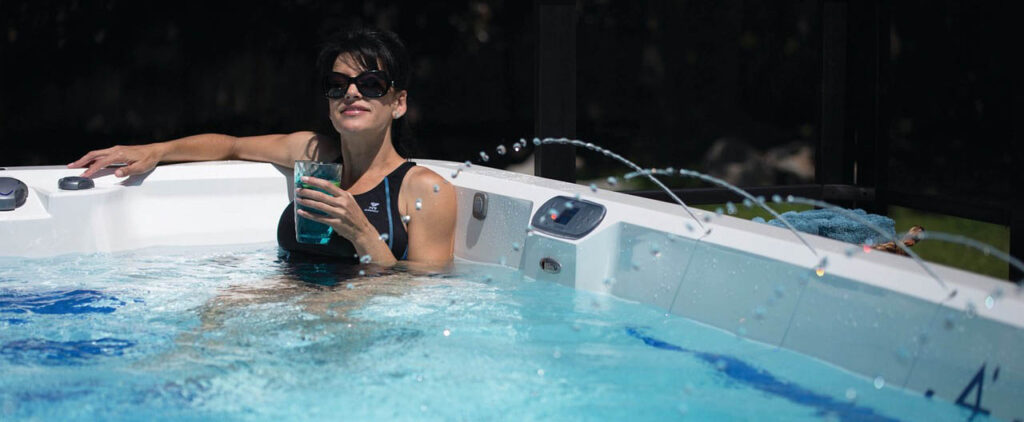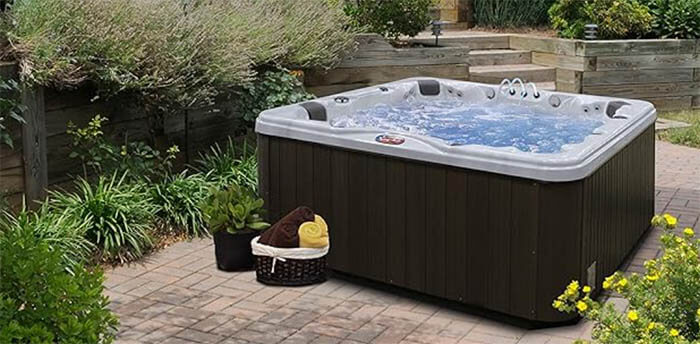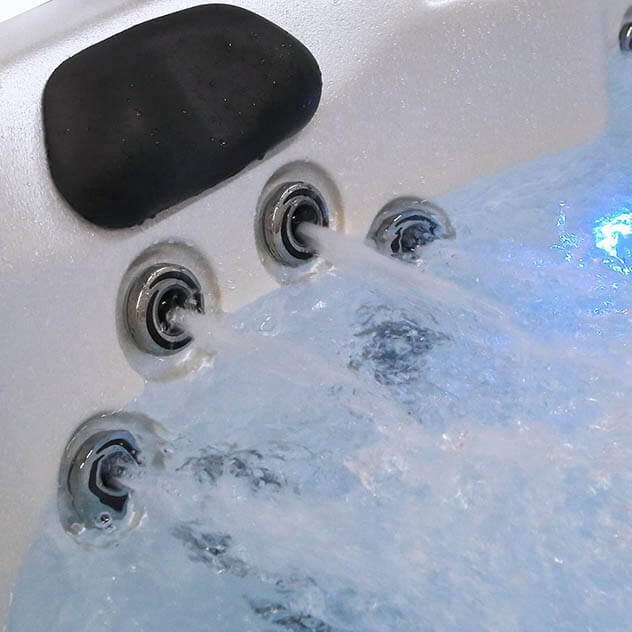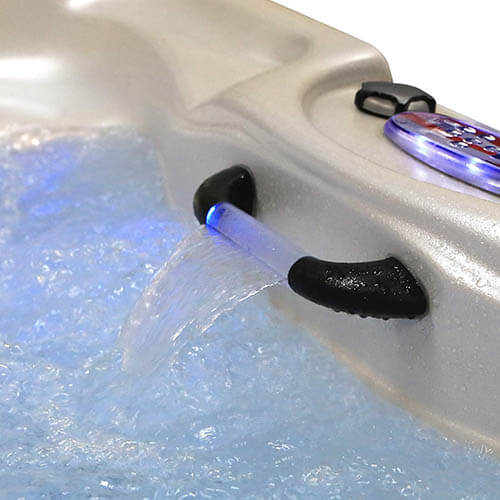
25 Reasons -Why Buy a Hot Tub?
Why buy a hot tub? If you’re seeking a way to unwind after a long day, enhance your health, and create a social hub in your home, a hot tub could be the perfect solution.
In this article, we’ll explore how a hot tub can transform your daily routine by offering not just relaxation and entertainment but also tangible health benefits such as improved sleep, muscle relaxation, and stress reduction.
We’ll delve into the practicalities, including the costs and maintenance involved, so you can make an informed decision. By the end, you’ll understand why investing in a hot tub might just be the indulgence you deserve, bringing luxury and well-being right to your doorstep.
Here are 25 compelling reasons to – Why buy a hot tub:
Health & Wellness

- Stress Relief: Soaking in warm, swirling water melts away tension and reduces the impact of stress on your body.
- Better Sleep: Hot tub sessions before bed promote relaxation and help you achieve deeper, more restful sleep.
- Muscle Recovery: The warm water and massaging jets soothe sore muscles, aiding in post-workout recovery.
- Pain Relief: Hydrotherapy offers relief from chronic pain conditions like arthritis, fibromyalgia, and back pain.
- Improved Circulation: Increased blood flow promotes healing and delivers vital nutrients throughout your body.
- Diabetes Management: Studies suggest regular hot tub use can help people with Type 2 diabetes better manage blood sugar levels.
- Lower Blood Pressure: The relaxed state induced by hot tub time can contribute to lowering blood pressure.
Lifestyle and Social Benefits
- Family Time: A hot tub provides a fun and relaxing environment to connect with loved ones.
- Romantic Escape: Unwind with your partner under the stars for a special date night at home.
- Entertainment Hub: Perfect for hosting gatherings and making your backyard the go-to spot for friends.
- Boost Home Value: A hot tub can be a desirable feature, increasing the potential resale value of your home.
- Year-Round Enjoyment: With proper care, your hot tub offers relaxation in all seasons.
- Privacy and Convenience: Enjoy a spa-like experience in the comfort of your own home, on your own schedule.
- Staycation Vibes: Transform your backyard into a relaxing oasis for a mini vacation any day.
- Enhance Landscaping: A hot tub integrates beautifully into your outdoor space, adding luxury and aesthetic appeal.
Specific Conditions
- Fibromyalgia Relief: Hydrotherapy is recognized for its ability to reduce pain and stiffness associated with fibromyalgia.
- Restless Leg Syndrome Aid: Warm water and buoyancy can help ease leg discomfort and promote relaxation for those with RLS.
- Post-Surgery Recovery: If recommended by your doctor, hot tub sessions can help increase mobility and promote healing.
- Headache Management: Tension headaches and migraines may be eased by hydrotherapy.
- Mood Booster: Regular hot tub use encourages the release of endorphins, improving overall mood and well-being.
Beyond the Basics
- Aromatherapy Enhancement: Enhance the benefits of your soak with calming essential oils.
- Aqua Exercise: The water’s buoyancy provides a low-impact environment for gentle exercise.
- Mindfulness Practice: The stillness of a hot tub soak provides space for reflection and stress reduction.
- Stargazing: Your hot tub is the perfect spot for catching falling stars or just admiring the night sky.
- The Simple Joy: At the end of the day, hot tubs are just plain fun and bring an extra dose of pleasure to life.
Owning a hot tub provides a multitude of benefits that can improve your quality of life in many different ways. Whether it’s physical health benefits like muscle relaxation and pain relief, or mental health improvements like stress reduction and enhanced sleep, a hot tub can be a worthwhile investment.
Is a Hot Tub Worth It? – Expectation vs Reality
Contents
- 1 Is a Hot Tub Worth It? – Expectation vs Reality
- 2 Why Buy a Hot Tub?
- 3 How a Hot Tub Can Improve Your Sleep and Help You Unwind?
- 4 Are Hot Tubs a Good Investment?
- 5 Pros and Cons of Buying a Hot Tub
- 6 Final Thoughts
Whether a hot tub is “worth it” depends entirely on your individual needs, priorities, and how well you understand both the potential benefits and the ongoing costs and commitment. Here’s a breakdown of expectation vs. reality to help you decide:
Expectations
- Instant Relaxation Haven: People envision a hot tub as the ultimate stress reliever, ready at any time.
- Social Magnet: Images of lively hot tub parties and effortless bonding are common marketing tools.
- Health Miracle: Hydrotherapy can be incredibly beneficial, but hot tubs aren’t a magic cure for chronic conditions.
- Minimal Upkeep: Some people underestimate the maintenance required for a sparkling clean hot tub.
- Boost in Home Value: While a hot tub can add some appeal, it’s not a guaranteed return on investment.
Reality
- Relaxation Takes Effort: Getting the most out of your hot tub means setting aside dedicated time, even short 20-minute soaks. It’s not always “ready to go” the moment the urge strikes.
- Social Success Varies: A hot tub can be great for socializing, but it won’t turn you into an instant party host. It takes effort to gather people.
- Health Aid, Not a Cure: While hot tubs are fantastic for wellness, managing chronic conditions usually requires a multi-faceted approach with your doctor’s guidance.
- Maintenance is Essential: Regular water chemistry checks, cleaning, filter changes, etc., are vital. Neglect leads to water issues and potential damage.
- Home Value is Subjective: Some buyers love hot tubs, others see them as a hassle. Your return on investment may vary.
Factors that make a hot tub “worth it”:
- You prioritize wellness and relaxation: If you’ll truly use the hot tub regularly for stress relief, muscle recovery, or health benefits, it might be a great investment.
- You actually enjoy the maintenance: Some people find the routine of water care satisfying. If you despise chores, a hot tub might become a burden.
- Your climate cooperates: Hot tubs are best used in moderate or cool climates. In very hot areas, they’re less appealing for much of the year.
- Social fit: If you already host get-togethers or have family eager to soak, the hot tub will get more use.
- Budget allows for long-term costs: Factor in electricity, chemicals, potential repairs, and increased water usage in your monthly budget.
Before Buying:
- Test soak: Visit a showroom to try before you buy – is the experience as enjoyable as you imagined?
- Calculate ongoing costs: Get realistic estimates from dealers about your chosen model’s operational costs.
- “See” it in your yard: Visualize where it will go. Do you have privacy? Is it convenient to access?
In short: A hot tub can be a fantastic addition to your life, but it’s not a magical solution or an effortless luxury. Consider your true needs and lifestyle honestly to make the best decision for you.
Why Buy a Hot Tub?
Enhance Your Home’s Appeal and Value with a Hot Tub

While a hot tub is primarily a personal wellness and relaxation investment, it can also increase your home’s attractiveness and potential resale value. Here’s how to maximize the impact of your hot tub when considering your home’s appeal:
Strategic Installation and Integration
- Placement: Choose a location that’s both inviting and practical. Consider privacy, views, shelter from harsh elements, and ease of access from the house.
- Landscaping: Frame your hot tub with attractive landscaping. Plants, decks, patios, or pergolas enhance its visual appeal and create a sense of a dedicated relaxation zone.
- Lighting: Soft, ambient lighting adds ambiance in the evenings, making the hot tub a true backyard focal point.
- Permanence: For maximum appeal, aim for a built-in look. A hot tub sunk into a deck or surrounded by a hardscaped patio appears as a more integrated feature of the home.
Maintenance and Presentation
- Pristine Condition: A hot tub only adds value if it’s immaculate. Keep the water sparkling clean, the covers well-maintained, and address any cosmetic issues promptly.
- Cleanliness: Pay close attention to the surrounding area too. Ensure any decks, patios, or furniture are free of clutter and in excellent condition.
- Staging for Sale: When selling, create a spa-like atmosphere with fluffy towels, candles (unlit for safety), and soft music to set the mood for potential buyers.
Features That Attract Buyers
- Energy Efficiency: Hot tubs with excellent insulation and efficient heating systems are attractive due to lower operating costs. Highlight these features to buyers.
- Modern Design: Sleek, contemporary hot tubs integrate well with many architectural styles. If yours is an older model, consider whether an update might be worth it in the resale context.
- Size and Capacity: Choose a size that complements your yard. Families may appreciate a larger hot tub, while couples might be more drawn to a cozy, intimate space.
- Bonus Amenities: Built-in sound systems, waterfalls, lighting systems, and other premium features can increase the “wow” factor.
Important Considerations
- Local Market: Research whether hot tubs are in demand in your area. They might be less appealing in very hot climates.
- Professional Input: Consult a real estate agent for insights specific to your neighborhood and home style. They can help determine if a hot tub is likely to pay off.
- Cost vs. Return: While a hot tub can increase appeal, don’t expect to recoup the full investment. Consider it a partial return and a long-term enjoyment factor.
Remember: A hot tub can enhance your home’s appeal when it’s thoughtfully integrated, beautifully maintained, and aligns with the preferences of potential buyers in your area. Do your research and weigh the enjoyment you’ll get from the hot tub alongside its potential impact on your home’s value.
Therapeutic Benefits, Stress Relief and Relaxation: Why a Hot Tub Might Be Just What You Need

In today’s fast-paced world, finding effective ways to relax and manage stress is more important than ever. A hot tub can be an excellent solution, offering both therapeutic benefits and a sanctuary for stress relief and relaxation. Here’s why incorporating a hot tub into your routine might be just what you need:
Therapeutic Benefits
Hydrotherapy: One of the most significant advantages of a hot tub is hydrotherapy. The combination of heat, buoyancy, and massage provided by the water jets creates an environment that helps relieve physical pain and muscle tension. This is particularly beneficial for those suffering from arthritis, chronic pain, and muscle fatigue.
Improved Circulation: The warm waters of a hot tub help to dilate blood vessels, improving circulation throughout the body. This increased blood flow accelerates the healing process of injured tissues and muscles, while also helping to reduce blood pressure.
Better Joint Health: The buoyancy provided by the water in a hot tub reduces the gravitational pull on the joints, which can significantly relieve pain and stiffness. This aspect of hydrotherapy is especially useful for individuals with joint disorders like osteoarthritis.

Stress Relief and Relaxation
Mental Health Benefits: Soaking in a hot tub can also have profound effects on your mental health. The soothing environment helps to reduce stress and anxiety by calming the nervous system and promoting the release of endorphins, which are the body’s natural ‘feel good’ chemicals.
Enhanced Sleep Patterns: The temperature regulation before bedtime can be crucial for inducing sleep. The drop in body temperature after getting out of a hot tub can signal the body that it’s time to sleep, helping those with insomnia or irregular sleep patterns find a more restful night’s sleep.
A Sanctuary from the Modern World: In a world where we are constantly bombarded by stimuli, a hot tub provides a private retreat. It’s a place where you can disconnect from digital devices and the stress of everyday life, allowing you to enjoy moments of solitude or connect with family and friends in a relaxed setting.
Lifestyle Enhancement

Quality of Life: Regular use of a hot tub can significantly enhance your overall quality of life. It provides a dedicated space and time to focus on self-care, relaxation, and recovery, which are essential components of a healthy lifestyle.
Social Benefits: A hot tub is not just for solitary relaxation; it can also be a focal point for social gatherings. It offers a unique environment for relaxed conversation and bonding with loved ones, enhancing your social life and strengthening relationships.
Convenience: Having a hot tub at home is incredibly convenient. It offers the benefits of a spa-like experience without the need to travel or pay ongoing membership fees. This accessibility makes it easier to integrate therapeutic and relaxation practices into your daily routine.
A hot tub represents an investment in your health, wellness, and overall quality of life. Whether it’s the therapeutic effects of hydrotherapy, the mental benefits of stress relief, or the lifestyle enhancements it provides, a hot tub can be a valuable addition to your home. If you’re looking for a way to unwind, improve your health, and create a space of tranquility, a hot tub might be just what you need.
How a Hot Tub Can Improve Your Sleep and Help You Unwind?
A hot tub can be a fantastic tool for improving sleep and helping you unwind, serving as a natural remedy for those struggling with insomnia or simply seeking a more restful night. Here’s how the soothing qualities of a hot tub can contribute to better sleep and relaxation:
How Hot Tubs Promote Better Sleep
- Circadian Rhythm Reset: Our bodies follow a natural sleep-wake cycle, with temperature playing a key role. Soaking in a hot tub raises your core temperature, and the subsequent cooling down as you exit mimics the natural temperature drop that signals bedtime.
- Muscle Relaxation: Tension in your muscles makes it hard to fall asleep. The heat and massaging jets loosen tight areas, promoting a physically relaxed state more conducive to sleep.
- Reduced Stress & Anxiety: Stress is a major sleep disruptor. Hot tubs induce a relaxation response, lowering cortisol (the stress hormone) and soothing your mind for easier sleep.
- Pain Relief: Aching muscles or chronic pain can keep you up. Hydrotherapy reduces both pain and inflammation, creating a more comfortable environment for drifting off.
Unwinding and De-stressing
- Mental Reset: A hot tub provides a designated relaxation space. Stepping away from screens, responsibilities, and the busyness of life forces a much-needed mental break.
- Sensory Soothing: The physical sensations of warmth, gentle buoyancy, and massaging jets create a multi-sensory experience designed to reduce tension and increase calmness.
- Mindfulness Opportunity: The simplicity of being in your hot tub encourages mindful presence. Focusing on your breath and body sensations further melts away stress.
- Dedicated “Me Time”: Making hot tub soaks a regular ritual trains your brain to associate it with relaxation, creating a powerful cue for your body and mind to unwind.
Tips for Optimal Sleep Benefits
- Timing Matters: Aim for a soak around 90 minutes before your ideal bedtime. This allows for the temperature regulation effect to kick in.
- Create a Routine: Develop a pre-bed ritual around your soak – dim lights, calming music, perhaps a cup of herbal tea – to further signal the transition to sleep.
- Avoid Distractions: Leave your phone out of the hot tub area to maximize mental disconnect.
- Short and Sweet: Keep soaks to about 15-20 minutes, especially before bed. Too long can be overstimulating.
Important:
- If you have any medical conditions, consult your doctor before using a hot tub.
- Hot tubs are not a cure for serious sleep disorders. If you struggle with chronic insomnia, seek professional guidance in addition to utilizing your hot tub for relaxation.
The Bottom Line: A hot tub offers a unique combination of physical and mental benefits that directly translate to better sleep and a greater ability to de-stress. By understanding how it works, and incorporating it thoughtfully into your routines, a hot tub can be a powerful tool for enhancing your overall well-being.
Are Hot Tubs a Good Investment?
Whether a hot tub is a “good” investment depends entirely on what your goals are and how you define “value”. Here’s a breakdown of factors to consider:
Arguments for “Yes”:
- Health and Wellness: If you prioritize stress reduction, muscle recovery, pain management (especially for chronic conditions), and sleep improvement, the therapeutic benefits of a hot tub offer significant value.
- Lifestyle Enhancement: A hot tub creates a backyard oasis for relaxation, family/couple time, and low-key entertaining with less need to leave home for spa visits.
- Increased Home Value (Sometimes): A well-maintained and integrated hot tub can add appeal for some buyers. Value depends on your location, the hot tub itself, and even the current real estate market.
- Long-Term Enjoyment: Hot tubs are durable, lasting for years (even decades) with proper care. If you’ll truly use yours frequently, the cost can be amortized over a long, pleasurable timeframe.
Arguments for “Maybe Not”:
- Upfront Cost: Hot tubs are a significant outlay—there’s the tub itself, installation, and accessories.
- Ongoing Expenses: Electricity, water chemicals, maintenance, and potential repairs all factor into the long-term cost of ownership.
- Time Commitment: A hot tub requires regular maintenance (water chemistry, cleaning) to stay enjoyable. If you despise chores, it might become a burden.
- Unused Potential: If the novelty wears off and the hot tub sits unused, it’s a sunk cost with no return on your investment.
- Uncertain Resale Value: While a hot tub can sometimes add value, it’s not guaranteed. Some buyers may see it as a maintenance headache.
Who benefits most from a hot tub investment?
- People who value health & wellness and will prioritize regular use.
- Those who enjoy maintaining their homes and don’t mind the added tasks.
- Homeowners with a conducive layout for attractive hot tub integration.
- Individuals in climates where the hot tub can be enjoyed for a good portion of the year.
Before you buy:
- Test it out: Visit a showroom to experience a hot tub and make sure you truly enjoy it.
- Calculate true costs: Get dealer estimates for electricity, supplies, etc. based on your chosen model.
- Consider a pre-owned option: You can sometimes find excellent deals on well-maintained used hot tubs.
Bottom Line: A hot tub isn’t a money-making investment or a guaranteed path to increased home value. It’s more about the quality of life, health, and pleasure it adds if it aligns well with your lifestyle and priorities.
Pros and Cons of Buying a Hot Tub
Buying a hot tub can be a significant decision with many benefits, but it also comes with drawbacks. Considering both sides will help you determine if it’s the right choice for you. Here’s a detailed look at the pros and cons of purchasing a hot tub:
Pros of Buying a Hot Tub
1. Health Benefits:
- Stress Relief: Soaking in a hot tub can reduce stress and anxiety through warm water therapy.
- Muscle Relaxation: The jets and warm water help soothe aching muscles and reduce stiffness.
- Improved Sleep: The heat from the water can promote relaxation and lead to a more restful sleep.
- Pain Relief: It can be particularly beneficial for those with arthritis and chronic pain, as the buoyancy of the water lessens stress on joints and the heat helps to alleviate discomfort.
2. Social and Recreational Benefits:
- Enhanced Social Life: A hot tub can be a gathering spot for friends and family, enhancing your home’s entertainment potential.
- Personal Relaxation: Provides a private retreat where you can unwind alone or with loved ones.
3. Increased Home Value:
- A well-maintained hot tub can increase the attractiveness of your property to potential buyers, particularly in markets where outdoor living is prized.
4. Year-Round Use:
- Hot tubs can be enjoyed throughout the year, providing a warm, relaxing space outdoors even in colder months.
Cons of Buying a Hot Tub
1. High Initial and Ongoing Costs:
- Initial Investment: The cost of purchasing and installing a hot tub can be quite high.
- Maintenance Expenses: Regular maintenance, including chemicals, water use, and electricity, adds to the ongoing costs.
- Repair Costs: Over time, you might face costly repairs or the need to replace parts.
2. Maintenance Requirements:
- Hot tubs require regular cleaning and water care to maintain water quality and functionality, which can be time-consuming.
3. Energy Usage:
- Hot tubs require a significant amount of electricity to keep the water heated, which can lead to higher energy bills.
4. Space Requirements:
- You need adequate space for installation, and the weight of a filled hot tub can require additional structural support, especially for decks or elevated platforms.
5. Limited Use in Some Climates:
- In extremely hot or cold climates, the cost of heating or cooling the hot tub can become prohibitive, and comfort levels may be affected.
6. Health Risks:
- If not properly maintained, hot tubs can harbor bacteria and other microbes, leading to potential health risks like skin irritations or infections.
Final Thoughts
Ultimately, buying a hot tub is an investment in your health and happiness. If you long for dedicated stress-relief, enhanced sleep, muscle recovery, or simply a backyard retreat for relaxation and bonding with loved ones, a hot tub can provide those benefits for years to come.
Just make sure you understand the upfront and ongoing costs, have a suitable location, and are committed to the maintenance to ensure your hot tub brings enjoyment rather than becoming a burden.

